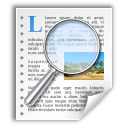Free readability tools to check for Reading Levels, Reading Assessment, and Reading Grade Levels.
[ HOME ] Check Your Readability: Check Text Readability NOW  Free Readability Calculators Learn about Readability Formulas: Dale-Chall Formula Flesch Reading Formula The Fry Graph SPACHE Formula [ View All ] Readability Help: [ View All Articles] Writing Tips: [ View All Articles] English Writing Products: StyleWriter software Site Map About Us Contact Us Write for Us |
How To Use A Thesaurus And Avoid The Commonest Mistakes In Choosing Alternative Words Most word processing programs have the facility of a thesaurus. A thesaurus is simply a list of synonyms and a synonym is a word that can be exchanged for another word without affecting the meaning of the sentence.
There is a myth that writing which contains unusual or impressive looking words is more valuable than writing that uses simple words. Many people use a thesaurus to find a word that they consider better than the word they would otherwise use. They want to appear learned and so they often use words that are not in common use. They want their writing to appear intellectual. Students do this in essays and writers whose main purpose is not to inform but to impress look through a thesaurus seeking a word that they think their reader will see and say to himself or herself, “Wow, he really knows what he's talking about”. But the main purpose of writing is to communicate, and communication means transferring the thoughts and intentions of one person to the brain of another person and it is therefore essential that the person receiving the message understands the words used in sending the message. If you write something that the receiver does not understand or misinterprets then you have failed to communicate. It is not the fault of the receiver it is the fault of the sender. The best use of a thesaurus therefore is to make your writing simple and direct. Don't look for long words, look for short words that say what you mean, or select the simplest one which says what you mean. Obviously if you are only looking for a different word to avoid appearing or sounding repetitive you can choose a word which is no better than the one you're using but simply different. How can we tell whether a word is simple enough? An easy test is to think whether you would use this word if you were just speaking to somebody in the street? If you wouldn't use the word there, why use it in something that you are writing? If you’re writing something for experts in some subject, for example, if you are an electrical engineer writing for other electrical engineers then you could safely use technical words but if you’re writing for the general public it is best to assume that they won't know words that people are not using in their conversation every day. There are readability tests such as the Flesch Reading Ease score or the Gunning Fog Index which score a piece of writing by counting the number of words per sentence and the average number of syllables per word. These tests agree that the general public has a reading age of about fourteen or fifteen years and therefore the general public either cannot or will not read material that has long sentences and long words with many syllables. About Readability >> READABILITY FORMULAS New Dale-Chall - Flesch Reading Ease - Flesch Grade Level - Fry Graph -Gunning FOG - Powers-Sumner- Kearl - SMOG - FORCAST - Spache  StyleWriter software: use it to write better content! Download your free trial! |
|
|
||